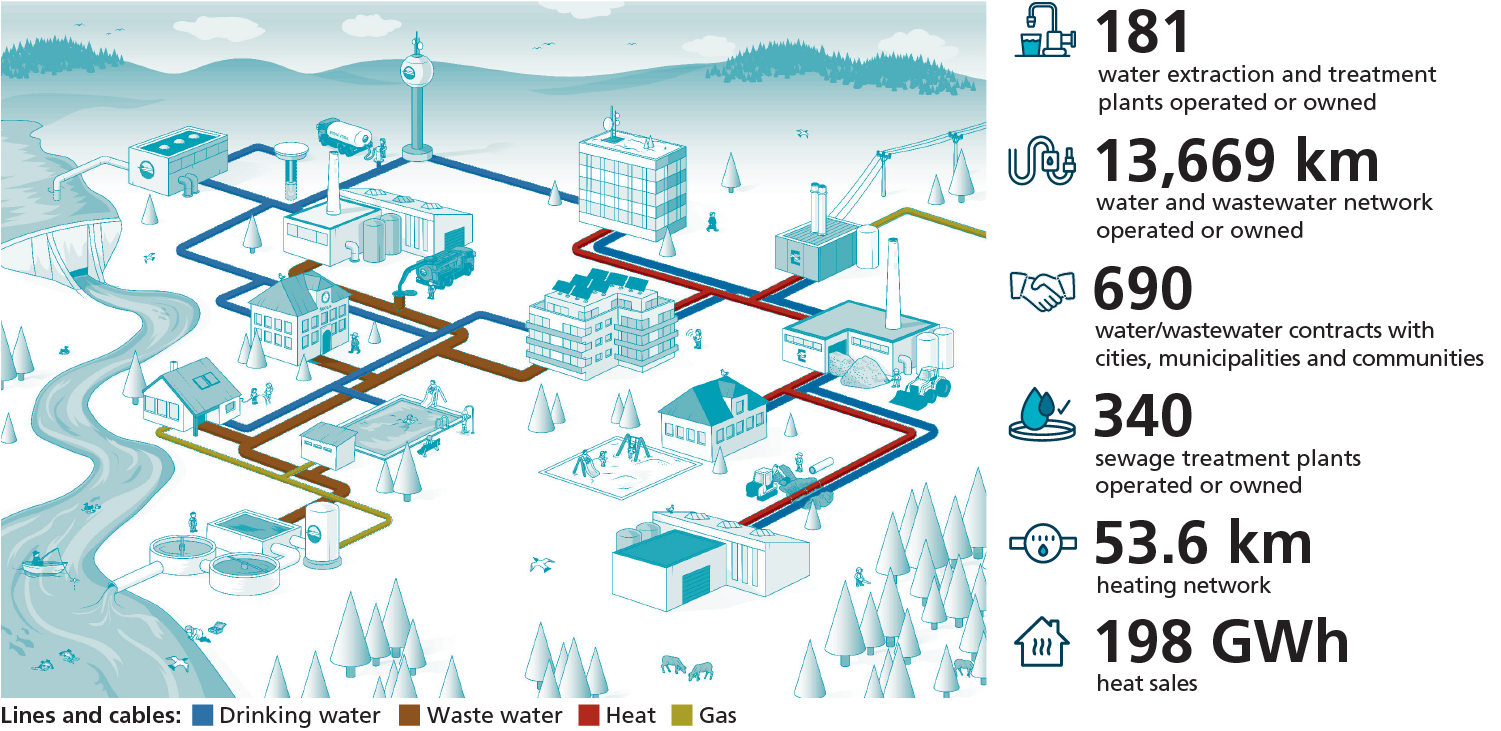In the Czech Republic, Energie AG is pursuing two different operational models on the water and waste water management market. The operator model is defined as the public sector (cities, municipalities, communities) owning the infrastructure and outsourcing its operation by means of awarding long-term contracts (concessions, leases, leaseholds). In the asset owner model, Energie AG both operates and owns the infrastructure.
Energie AG’s Heating business unit is supplying district heat and warm water to residential, commercial and industrial customers in the Czech Republic. The supply is, for example, supported by cogeneration units and biomass heating plants as well as industrial exhaust heat.
The activities in the Czech Republic are illustrated using the key figures below.

In fiscal year 2021/2022, the Czech Republic Segment supplied just short of 1 million people with approx. 49.2 million m3 of drinking water (previous year: approx. 48.2 million m3) and provides waste water management services to around 700,000 residents with around 45.2 million m3 waste water (previous year: approx. 45.1 million m3). Given that local authorities are responsible as the owners for renovating networks (except for one investment – VaK Beroun a.s.), Energie AG’s measures focus on locating and repairing leaks. In recent years, extensive investments have been made in modern hardware and software for hydraulic network modelling, as well as in expanding district metered areas, supplying equipment and providing employee training.
The measures taken in response to the turbulences on the European energy market in fiscal year 2021/2022 include, for example, a distribution of the procurement risks among a number of suppliers and an intensified monitoring of the development of energy prices. The supply of residential, commercial and industrial customers in the Czech Republic with drinking water and waste water management services was, despite the impact of the war between Russia and Ukraine, assured at all times in fiscal year 2021/2022.
A benchmarking in accordance with the internationally accepted “unit water leakage” method paints a positive overall picture for the 69 supply areas (previous year: 52) that each have a population of more than 5,000. In fiscal year 2019/2020, 92% of the networks were in good condition, 6% in average condition and 2% in poor condition. For the 2020/2021 fiscal year, these values have changed to 88% in good condition, 9% in average condition and 3% (representing two municipalities) in poor condition.
The business area “Heat” in the Czech Republic Segment supplies over 80,000 residents with district heat (previous year: 50,000) and provides installation services for municipalities and private customers with a focus on energy efficiency and CO2 reduction. The ongoing investments in generation systems and heat distribution networks deliver an improved security of supply and a better energy efficiency. In the Czech Republic, the Energie AG Group operates boiler houses with an installed thermal output between 50 kW and 20 MW. Measures aimed at increasing their efficiency and reducing their CO2 footprint are carried out regularly.
Effects of climate change on the business model
The effects of climate change within the operations area of the Czech Republic Segment requires a differentiation between specific regional aspects as well as the water/waste water and heat business areas. For the supply with drinking water, quantitative resource problems must be expected regionally as well as over the course of the year. Peak coverage from additional storage facilities will become necessary in the case of longer periods with little precipitation. In the area of waste water, an increasing frequency of localised to regional heavy rain events must be expected to overburden the sewage systems and sewage treatment plants.
The operator model is affected to a lesser degree by the described scenarios, because the infrastructure is owned by the municipalities, who are bearing the risk of having to adapt the infrastructure. Opportunities arise from the municipalities’ need for additional funding, leading to opportunities in the area of public-private partnerships (PPP). In the few cases where Energie AG entities own the infrastructure, additional investments for the development of new resources, for peak demand coverage, and for adaptation of the precipitation/stormwater drainage management must be expected.
In the business area Heat, the milder cold periods must be expected to result in declining heat sales. Financial assistance from the EU climate initiatives may reinforce the trend toward new, alternative, and decentralised options for heat supply. At the same time, these new developments and the increasing demand for cooling supply offer the opportunity to develop new business models.
Further information on performance and output data as well as key figures, benchmarking and environmental topics can be found at www.energieag-bohemia.at and www.energieag.cz, as well as in the Group Management Report, Czech Republic Segment.

